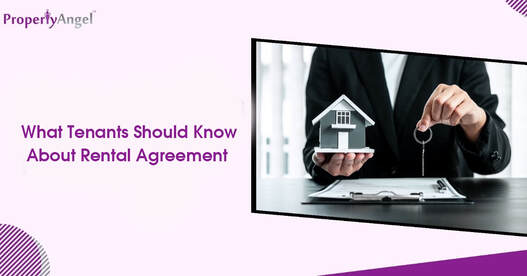|
If you are a landlord and are looking for a property to rent, it's important to have a written rental agreement. If you and your landlord ever get into a legal dispute, your chances of a favorable outcome drastically improve if you have a written agreement. This ensured proper rental management. Here are some important things that tenants must know before signing the rental agreementWhat exactly is a rental agreement?A rental agreement or a lease is a legal document that states that the owner and tenant have agreed to respect the rental regulations and contract terms. A rent agreement is usually drafted by the real estate agent or a property management company appointed by the landlord and the renter. To legitimize the deal, both the landlord and the tenant must sign it before two witnesses who are not any beneficiaries of the property and will sign the agreement as witnesses. What should a rental agreement include?A rent agreement specifies the terms and conditions under which a property is rented. The agreement consists of the tenant's and landlord's names and the address of the property being rented. Unfortunately, we frequently make the error of failing to read a contract before signing it. Instead, please obtain a copy of the rental agreement and thoroughly review it before signing. Ensure that the individual with whom you are dealing is the property's true owner/landlord. You also have the right to inspect the documentation proving that all prior bills relating to the residence, particularly the electricity, water, and gas bills, have been paid. A rent agreement specifies the amount of rent paid and the term of the agreement. A rent agreement is typically for 11 months. Also included at the start should be a clear indication of the terms and conditions under which the agreement might be extended when it expires. If the lease is for more than a year, the owner must register the lease by paying the required stamp duty. The rent agreement also specifies the security deposit that the renter must make with the landlord. Typically, the deposit is retained by the landlord for the term of the tenancy. The deposit money protects the landlord against the cost of replacing or repairing items if damaged by the tenant. The agreement also specifies the deadline for paying the rent. For example, it may be the 5th or 10th of every month. If the tenant fails to make the payment of the rent by the due date, the penalty charges that he will face should be included in the agreement. What are the important components of a rental agreement?
Rent escalation clauseA renter should check the lease to see whether there is a "rent escalation provision" that allows the landlord to increase the rent after six months. Also, check if the agreement specifies the date on which the rent amount will increase. Other termsExamine to see if the owner has included a "clause on the house's selling." If the landlord wishes to sell the house during the lease, you must know how many months you will have to move to another place. Your agreement should also include a language that clearly states who will be liable for regular property maintenance. The renter often handles minor property repairs. Other rental management pointers tenants should consider before signing a leaseMake sure you can afford the rentThis may sound apparent, but occasionally a wonderful location or a fully furnished flat may make you forget your budget. If you haven't already set a fixed budget yet, now is the time to do so. If you can't afford that fully furnished flat, you might want to resume your apartment search and look for locations that fit your budget. Finding a roommate to divide the rent with would help you a lot. Evaluate the must-havesSure, the fully furnished flat with multiple bedrooms must look very appealing. But, you should carefully evaluate if that is what you need. First, make a list of the facilities you want where you want to live, such as an on-site gym, parking, and other necessities, such as proximity to work, etc., and then make your choice accordingly. You won't feel like you're sacrificing anything if you evaluate what is necessary and what is not. If you're having problems distinguishing between a necessity and a desire, ask yourself, "Why do I want this amenity?" Is it possible for me to live without it? Is it necessary for my happiness? If you've decided it's something you must have, put it in the "need" column and don't look at apartments without it. Visit the property before signing the rental agreementBefore signing the rental agreement, go to the location where you wish to live on rent at least once. You must inspect the house's condition and ensure that all electrical and water connections are operational. Examine the windows to ensure they open, close, and lock correctly. Examine the walls as well. Also, make sure that all of the equipment in the house is in good functioning order. Normally, it is the owner's responsibility to guarantee that the property is handed over in excellent condition for possession. This would mean that the electrical and water connections are operational, including the electricity meter and water motor. Read the rental agreement properly and clear doubts beforehandYou must read the lease agreement — every word of it — as part of lease management. And it would help if you were confident that you understand it, so ask plenty of questions. The lease specifies everything, from when and how you pay rent to whether or not you can paint the walls. It should also inform you what will happen if you break the lease, how much the late charge is if you are late with the rent, if you are permitted to sublease your apartment or have roommates, and how much notice you are needed to give before moving out. If you don't read it, you may unknowingly breach your lease. Consider additional charges like society maintenance, bills, etcThe rent agreement may also come with other monthly expenses to be paid by the renter, such as the society maintenance fees, electricity bill, and water bill. In addition, the rental agreement may also include information about the property's amenities, such as parking space. These additional expenses and who is responsible for them should be explicitly stated in the rental agreement. Be informed about notice period & penaltyIf any party fails to respect the terms and conditions of the agreement, it will cause disputes, and the aggrieved party may seek monetary damages. As a result, the agreement should include a notice period and a penalty for cancelling the agreement before the designated term is completed. Normally, a one-month notice period is served.
0 Comments
Leave a Reply. |
Archives
February 2024
Categories |


 RSS Feed
RSS Feed